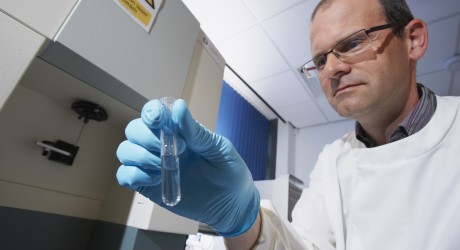RESEARCHERS at the University of the Highlands and Islands have discovered that a drug currently licensed for use in reversing the harmful effects of paracetomol overdose has the potential to reduce the risk of heart disease in patients with Type 2 Diabetes.
Says a spokesperson: “Heart disease is the major cause of reduced life expectancy in patients with diabetes, but aspirin, the drug normally used to prevent heart attacks, is less effective for people with diabetes.”
In a study funded by the Chief Scientist Office (CSO), the team, led by Professor Ian Megson at the University’s Department of Diabetes and Cardiovascular Science in Inverness, found that the blood platelets, which are a vital component of blood clots that underpin heart attacks and some forms of stroke, have depleted reserves of a key antioxidant called glutathione in patients with Type 2 Diabetes.
The spokesperson added: “The work, published in the journal Diabetologia, found that once daily treatment of patients with the drug called N-acetylcysteine brought platelet glutathione back to normal and reduced indicators of clot formation in the blood.”
Professor Ian Megson, who led the research, explained: “Aspirin has long been recognised to be useful in helping to prevent heart attacks, but it has recently been found to be largely ineffective in patients with diabetes before there is evidence of heart damage.
“There is an urgent need to find new drugs as alternatives to aspirin in this vulnerable group of patients.
“This study represents an important early step in finding just such a drug: we are now in the hunt for further funding to take the therapy to larger trials to establish its potential in patients with both Type 1 and Type 2 Diabetes.”
And researchers were encouraged by an added advantage of the study which discovered the drug only worked in patients with low glutathione levels, meaning doctors knew exactly which patients would be helped most and could target the drug where it would be most effective.
Professor Megson added: “Patients could therefore be screened in advance to establish whether each individual would draw benefit from the drug.”
Professor Andrew Morris, Chief Scientist for Health, said: “I am pleased that this CSO-funded study has had such positive results and might, in the future following confirmation in larger-scale trials, lead to tangible health benefits for people with diabetes.
“This group of people are particularly vulnerable to cardiovascular problems and therefore such research is timely and necessary.”
Professor Sandra MacRury, Professor of clinical diabetes at the University of the Highlands and Islands, said: “Patients with Type 2 Diabetes have an increased risk of all types of vascular disease even when high blood pressure and cholesterol have been treated and we know that aspirin is really only useful in patients who have already had a heart attack, stroke or circulation problem.
“The important finding we have made in this study raises the possibility of preventing these problems by offering a new treatment to patients at risk at an earlier stage.”
ENDS
Picture caption: Dr Andy Treweeke, Postdoctoral Researcher testing for the antithrombotic effects of acetylcysteine. NB We also have pictures of Professor Megson if you would prefer.
Notes to editors
The University of the Highlands and Islands comprises thirteen further and higher education colleges, specialist colleges and research institutions, distributed throughout the Highlands and Islands of Scotland.
They are bound together through constitutional, management and academic structures, and co-ordinated through an executive office. Collectively, this is referred to as the UHI partnership.
There are currently over 7,500 students studying on undergraduate and postgraduate courses or undertaking postgraduate research with the University.
The University of the Highlands and Islands is the only university with campuses and headquarters based in the Highlands and Islands. Its mission is to strengthen and develop the social, economic and cultural prospects of the region. It uses a blend of learning methods, including traditional classroom face-to-face teaching, video-conferencing tutorials and lectures and virtual learning environments and other IT media.
The University of the Highlands and Islands is a limited company registered in Scotland No. 148203. Scottish charity No. SC022228. Registered office: 12B, Ness Walk, Inverness, IV3 5SQ.
MEDIA RELEASE posted by UHI. You too can post media releases (aka press releases) on allmediascotland.com. For more information, email here.
Contact: Alison Lochhead
Phone: 01463279222
Email: alison.lochhead@uhi.ac.uk
Website: http://www.uhi.ac.uk






